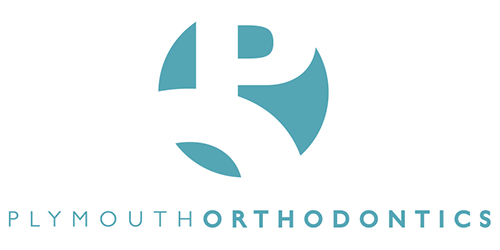Do I Really Need Braces?
What does your smile say about you? For most people, an attractive smile is an important part of the overall impression a person makes. A beautiful smile radiates confidence and projects a positive image about you. A beautiful smile is also a powerful part of looking and feeling your best. Plymouth Orthodontics can make a real difference in your smile.
Our patients typically seek orthodontic treatment for one of the following reasons:
-
Health
Crooked teeth are harder to clean. This can make the gum tissue more susceptible to disease and the teeth more prone to decay. Straight teeth are definitely healthier teeth.
-
Function
Teeth that are crowded, protruded, or misaligned do not usually function ideally. This can result in excessive tooth wear and sensitive teeth.
-
Stability
Teeth and jaws that are well aligned can be stabilized to reduce undesirable shifting.
-
Esthetics
Appearance is often the most popular reason for orthodontic treatment. An attractive smile enhances self-esteem and self-confidence, which can make a positive difference at school, at work and in the community. Boosting self-confidence will give you and your child smile power.
Are you a candidate for orthodontic treatment?
Beyond creating a great smile, orthodontics also improves bad bites or “malocclusions.” A malocclusion occurs when the teeth and/or jaws are not properly aligned. Malocclusions can affect the way you clean your teeth, the way you chew and the way you smile. Oftentimes malocclusions can even affect the way you feel about your smile. The following are some of the malocclusions, which can be successfully treated with orthodontics.
-
Protrusion of Upper Front Teeth
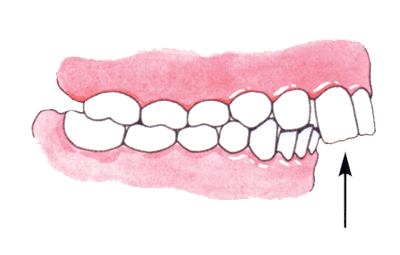
This type of bite can result from the upper teeth being too far forward or the lower teeth being too far back. Function and esthetics are affected with this bite.
-
Overbite
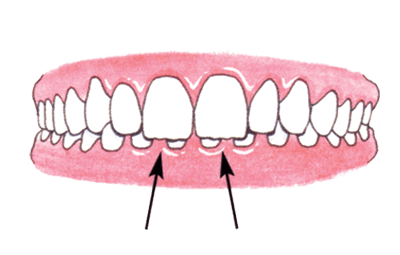
The upper front teeth overlap too much of the lower front teeth. Many times the lower front teeth bite into the roof of the mouth. (Ouch!)
-
Crossbite
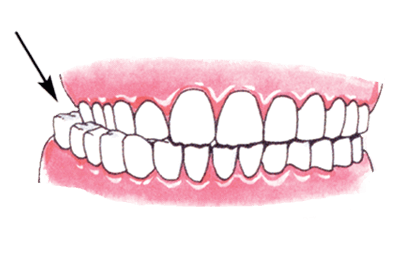
This is when the upper teeth fit inside the lower teeth. Oftentimes we see unfavorable jaw growth and excessive tooth wear with untreated crossbites.
-
Open Bite
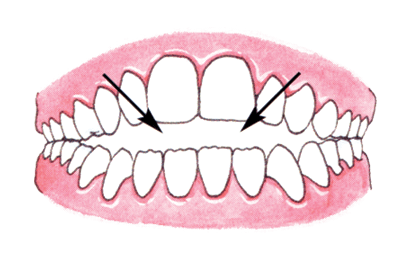
The upper and lower front teeth do not overlap. We often see thumb or finger sucking habits and tongue thrusting with this bite. Proper chewing is definitely affected.
-
Crowding
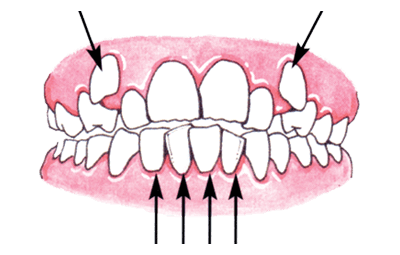
This occurs when teeth do not have enough room to erupt. Appropriate expansion can correct crowding, many times without tooth removal.
-
Spacing
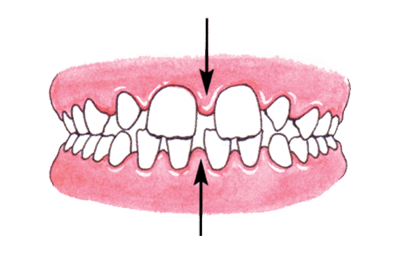
Most of the time spacing is an esthetic concern, but sometimes spacing can mean that teeth are missing. Significant spacing because of missing teeth can result in teeth tipping and long-term stability problems.
-
Dental Midlines Not Matched
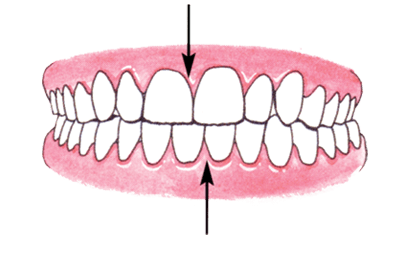
This usually indicates that the back bite does not match properly. Function may be negatively affected by this type of malocclusion.
What can happen if malocclusions are not treated?
According to studies by the American Association of Orthodontists, untreated malocclusions may result in a variety of problems. Crowded teeth are more difficult to properly brush and floss, which contributes to tooth decay and gum disease. Protruding teeth are more susceptible to accidental chipping from trauma. Crossbites can result in unfavorable growth patterns and uneven tooth wear. Open bites can result in tongue-thrusting habits and speech problems.
The bottom line, with all the wonderful benefits of successful orthodontic treatment, your investment in orthodontics is an investment in your health and a lifetime of beautiful smiles.
